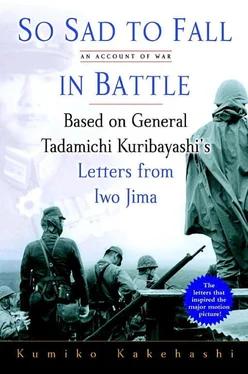Finally, I append an inept work for your perusal below. Please forgive its clumsiness.
Postscript
Unable to complete this heavy task for our country
Arrows and bullets all spent, so sad we fall.
But unless I smite the enemy,
My body cannot rot in the field.
Yea, I shall be born again seven times
And grasp the sword in my hand.
When ugly weeds cover this island,
My only thought will be the Imperial Land.
Kuribayashi had instructed his men to live a life more agonizing than death; ordered them to wring the very last drop out of their lives. But in a battle where neither victory nor a safe return home could be hoped for, he also would not allow his men to die heroic deaths. To set down in writing how the men who had faithfully followed his orders had lived and died—something that the people in the homeland would never otherwise know—was the final duty for the commanding officer who had held the lives of more than twenty thousand men in his hands.
Kuribayashi had no way of knowing that the Imperial General Headquarters would alter his telegram, but he must have known that the phrase “empty-handed and ill-equipped” was sure to rub the higher-ups the wrong way. He must also have known that expressing grief for dying soldiers with the word “sad” was unacceptable behavior, quite unsuitable for an officer of the Imperial Army. Yes, Kuribayashi did know all that, but he wrote it nonetheless. Such was the nature of his farewell telegram.
In the early morning of March 17, Kuribayashi transmitted one more message. It was addressed to the Imperial General Headquarters, but it was actually an appeal to all his men on the island.
1. The battle is entering its final chapter.
2. On the night of the seventeenth, the whole group will execute an all-out attack and crush the enemy.
3. At midnight each unit shall attack the enemy in front of them, fighting gallantly down to the last man. The Emperor [three characters illegible] will not allow shirking.
4. I will at all times be at your head.
That everyone would die in the final all-out assault was a given, but Kuribayashi ordered one of his officers to stay alive.
That man, according to a memoir by Musashino Kikuzô, commander of the Engineering Battalion, was Major Yoshida Monzô, staff officer in charge of fortification building. Before going into combat, Kuribayashi gave him this order: “You must stay alive here on this island, then slip away from here some day and tell the citizens of Japan about the carnage here.”
Yoshida did as he had been ordered. He did not die in a last charge, but lived on. First he tried to get away from the island on a raft. When that failed, he stole an American plane and attempted to fly back to Japan. That came to nothing as well. Yoshida is believed to have been killed by enemy fire in mid-May.
The final Japanese attack did not come from the Command Bunker where the enemy pressure was at its most intense, but from the Kita Engineering Corps bunker about 60 meters away, where the 145th Infantry Regiment—the core of the Iwo Jima garrison—had established its center of command. The plan called for them to unite with the remnant of the navy force under Rear Admiral Ichimaru and make the attack from there.
A memoir by First Lieutenant Tamada Takeshi that is quoted in the official history includes the following description of what happened in the Command Bunker on the night of the seventeenth before the move to the bunker of the Kita Engineering Corps.
On the evening of March 17, we burned our insignia of rank, any important documents, and our private possessions. Everyone in the headquarters cave was presented with one cup of sake and two cigarettes from the Emperor. Lieutenant General Kuribayashi grasped the pommel of his sword with his left hand and made a speech to the following effect: “Even if you have to eat grass, bite the earth, or throw yourselves on the ground, I believe that you will fight and, in so doing, find a way out of this fatal situation. With things as they are, each one of you must kill one hundred—there is nothing else for it. I believe in your devotion. Please do as I do.” And on that very night the headquarters made their attack.
The passage says they “made their attack,” but, in fact, no all-out attack was made that evening; all they did was move to the bunker of the Kita Engineering Corps, which was to serve as the attack base. The Americans had gotten them so tightly boxed in that they could not find any opening through which to attack.
Kuribayashi’s words as recorded in this memoir are extremely heroic, but what of his appearance? The following is the testimony of Sergeant Ryûmae Shinya, who worked in the adjutant section and was one of those who made the move to the bunker of the Kita Engineering Corps that evening.
When we escaped from the Command Bunker in the dead of night on March 17, he was not energetic like the staff officers and other officers. At first glance, in fact, he looked like some old man from the countryside being led outside by his children. He was leaning on his cane, unarmed, and stood more or less in the middle of around 500 people together with the top medical officer and the head of ordnance, though the staff officers were somewhere else. That was the last I saw of our army corps commander. [From Ogasawara Heidan no Saigo]
Ryûmae was one of the very few survivors to have seen Kuribayashi from so close up. Takeichi Ginjirô, emeritus assistant professor of the National Defense Academy, met Ryûmae personally for research and states in his book Iô-Tô ( Iwo Jima ) that his testimony is extremely reliable.
Ryûmae is now dead, but, according to someone he spoke to before his death, he said, “His Lordship Kuribayashi had always been hale and hearty, but by then he was completely different: emaciated and with an expression of total exhaustion on his face.”
In few of the works written about the battle of Iwo Jima does one find any mention of Kuribayashi having shown any sign of weakness. Only Takeichi Ginjirô in Iô-Tô says that “He revealed a degree of spiritual frailty at the final stage when the annihilation of his men was imminent;” and that “The responsibility of forcing the men under his command to die in so cruel a battle unsettled his mind.” In all the other texts he is portrayed as a dauntless leader from first to last.
If we extrapolate from the image of Kuribayashi that emerges from his interactions with his men, the letters he wrote to his family, his war-lesson telegrams, and his farewell telegram, it does not seem impossible that he might have plunged into sudden despondency at the final stage.
What broke Kuribayashi’s spirit?
As Professor Takeichi points out, one likely cause was having to force the men under his command to take part in so merciless a battle. Kuribayashi was the kind of man incapable of regarding the soldiers he commanded—even the common soldiers whom he had never met—as mere pawns to be used to advance the cause of war. The sight of the weak, emaciated, and ghostlike soldiers dying in such numbers as they faced the terrifying intensity of the American assault on one hand, while suffering from hunger and thirst on the other, seems to have been a crushing blow for Kuribayashi.
Another factor could well have been him finding out that Tokyo had been subjected to indiscriminate strategic bombing on an unprecedented scale.
Kuribayashi is likely to have heard about the great air raid on Tokyo by this stage. He was still in communication with the Imperial General Headquarters and was able to receive radio broadcasts. Radio Tokyo (Japan Broadcasting Corporation Overseas Department) was making propaganda broadcasts aimed at the American troops in Asia and the Pacific region. Directly after the raid on Tokyo, it reported that the Japanese capital had been the victim of indiscriminate bombing from the air and voiced strong criticism of the United States, pointing out that the fire set off by the incendiaries had caused tremendous damage, the bulk of it being borne by unarmed civilians. The horrors Kuribayashi heard about certainly went beyond anything he could have imagined.
Читать дальше












